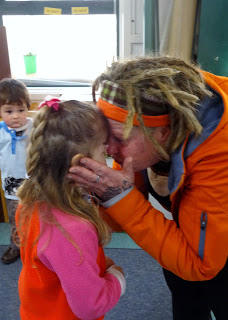Working
with artists and experts enables us to enrich our children’s lives with
knowledge and experience from our wider community.
Each Tuesday Mandy works with our tamariki (children), kaiako (teachers), and parents/whānau as a kairaranga (weaver), to share her knowledge and expertise in the art of traditional weaving.
Mandy has a 25 year relationship with flax which begun as a child and was nurtured under the guidance of Emily Schuster at the age of 19. Mandy lived in the Hokianga for 25 years, and has maintained a love of teaching and passing on her skills with wananga throughout Te Taitokerau (Tuatara Design Store). Mandy is also a Mum in our Kindergarten whānau.
On
Tuesday 6th of August we officially welcomed Mandy into our kindergarten as our
kairaranga, with a mihi whakatau. Mandy was accompanied by her Whānau, Arana, Tuiata and Kōrari.

Mandy and her whānau were called inside by a small group of our girls "Haere mai, Haere mai" they beckoned. Our Pou Whakarewa Tikanaga Māori advisor, Roimata Macfarlane then led us through the mihi whaktau process; beginning with a karakia, then followed by a welcome speech.
Anei mātou, ngā kaiako, ngā tamariki me ngā whānau hoki o te Kura Kōhungahunga o Mairtown.
Kei te harikoa mātou kia tae mai i waenganui i a koutou, Mandy me tō whānau I tenei wā. Ko tenei he ra whakahirahira na e mea, he tino taonga koe ki a mātou, tō wairua, tō ahuatanga me tō Matauranga hoki.
Mandy, kia maumahara ki tōnā mana āhua ake.
Nō reira, tēnā koutou, tēnā koutou, tēnā koutou katoa.
Here we are the teachers, children and families of Mairtown Kindergarten.
We are all very happy to be here amongst you Mandy and your family at this time.
This is a significant time because you are such a taonga to us, your wairua, your inner essence and your knowledge.
Mandy, cherish your absolute uniqueness.
Therefore, greetings, greetings, greetings to us all.
To support Roimata’s korero, the children, parents and teachers then stood and sung a waiata (song); E toru nga mea.

Hongi – the unique and very sacred Maori physical embrace wherein the two sides become one. The hongi is the traditional greeting of nose pressing. It is the exchange of the ha, or breath of life…This greeting makes the visitor at one with the tangata whenua [hosts]. The action of performing hongi is associated with the hariru. The two people shake hands, each using the right hand. At the same time the left hand maybe placed on or near the other person’s shoulder. This physical contact between manuhiri and tangata whenua lifts the waewae tapu/sacredness of first time visitors, allowing us all to be one.

Our mihi whakatau for Mandy cemented the beginning of a relationship of ako (teaching and learning). We feel very excited about the work and experiences that are already beginning to unfold, and anticipate our learning journey over the next 6 weeks.
Kaupapa Māori
assessment moves beyond a culturally situated perspective of learning, to
learning being seen deeply located with Māori ways of knowing and being.
 |
| Another of our taonga, Roimata Macfarlane |
“Puritia ngā taonga a nġa tupuna mō te ora, ā mātou tamariki”
“Holdfast to the cultural treasures of our ancestors for the future benefit of our children”
(Te Whatu Pōkeka, p.51)
Kim











1 comment:
Tena koe Kim
Wow! Ka mau te wehi, awesome J As usual you have captured such a meaningful occasion in your carefully chosen kupu with stunning photo’s that tell the story in a visual sense too. Mai i tēnei hononga ka tuwhera i ngā ara whānui – From this relationship, the pathway to development will open.
I love working alongside you and your team, I truly mean that…it is such a pleasure to be surrounded by such wonderful teachers…such lucky tamariki you have!
Nga mihi
Roimata
Post a Comment